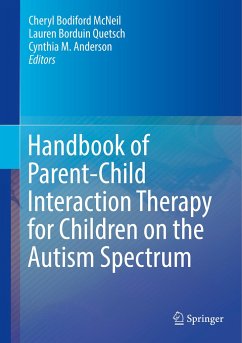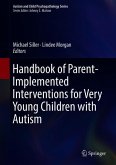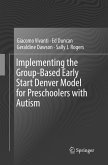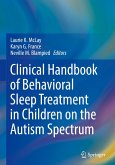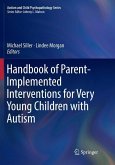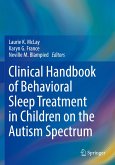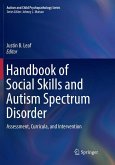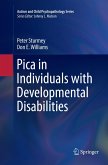Handbook of Parent-Child Interaction Therapy for Children on the Autism Spectrum
Herausgegeben:McNeil, Cheryl Bodiford; Quetsch, Lauren Borduin; Anderson, Cynthia M.
Handbook of Parent-Child Interaction Therapy for Children on the Autism Spectrum
Herausgegeben:McNeil, Cheryl Bodiford; Quetsch, Lauren Borduin; Anderson, Cynthia M.
- Gebundenes Buch
- Merkliste
- Auf die Merkliste
- Bewerten Bewerten
- Teilen
- Produkt teilen
- Produkterinnerung
- Produkterinnerung
This handbook offers a theoretical foundation for the adaptation of Parent-Child Interaction Therapy (PCIT) for children with autism spectrum disorder (ASD) and their families. The volume examines current treatments for children with ASD and provides a rationale for why PCIT is considered a strong option to address many of the concerns found within this population of children and families. It presents an overview of PCIT theory, the goals of PCIT, the unique aspects of the treatment, and the exceptional outcomes. The handbook demonstrates the versatility of PCIT in conjunction with standard…mehr
Andere Kunden interessierten sich auch für
![Handbook of Parent-Implemented Interventions for Very Young Children with Autism Handbook of Parent-Implemented Interventions for Very Young Children with Autism]() Handbook of Parent-Implemented Interventions for Very Young Children with Autism217,99 €
Handbook of Parent-Implemented Interventions for Very Young Children with Autism217,99 €![Implementing the Group-Based Early Start Denver Model for Preschoolers with Autism Implementing the Group-Based Early Start Denver Model for Preschoolers with Autism]() Giacomo VivantiImplementing the Group-Based Early Start Denver Model for Preschoolers with Autism66,99 €
Giacomo VivantiImplementing the Group-Based Early Start Denver Model for Preschoolers with Autism66,99 €![Clinical Handbook of Behavioral Sleep Treatment in Children on the Autism Spectrum Clinical Handbook of Behavioral Sleep Treatment in Children on the Autism Spectrum]() Clinical Handbook of Behavioral Sleep Treatment in Children on the Autism Spectrum320,99 €
Clinical Handbook of Behavioral Sleep Treatment in Children on the Autism Spectrum320,99 €![Handbook of Parent-Implemented Interventions for Very Young Children with Autism Handbook of Parent-Implemented Interventions for Very Young Children with Autism]() Handbook of Parent-Implemented Interventions for Very Young Children with Autism216,99 €
Handbook of Parent-Implemented Interventions for Very Young Children with Autism216,99 €![Clinical Handbook of Behavioral Sleep Treatment in Children on the Autism Spectrum Clinical Handbook of Behavioral Sleep Treatment in Children on the Autism Spectrum]() Clinical Handbook of Behavioral Sleep Treatment in Children on the Autism Spectrum169,99 €
Clinical Handbook of Behavioral Sleep Treatment in Children on the Autism Spectrum169,99 €![Handbook of Social Skills and Autism Spectrum Disorder Handbook of Social Skills and Autism Spectrum Disorder]() Handbook of Social Skills and Autism Spectrum Disorder231,99 €
Handbook of Social Skills and Autism Spectrum Disorder231,99 €![Pica in Individuals with Developmental Disabilities Pica in Individuals with Developmental Disabilities]() Peter SturmeyPica in Individuals with Developmental Disabilities100,99 €
Peter SturmeyPica in Individuals with Developmental Disabilities100,99 €-
-
-
This handbook offers a theoretical foundation for the adaptation of Parent-Child Interaction Therapy (PCIT) for children with autism spectrum disorder (ASD) and their families. The volume examines current treatments for children with ASD and provides a rationale for why PCIT is considered a strong option to address many of the concerns found within this population of children and families. It presents an overview of PCIT theory, the goals of PCIT, the unique aspects of the treatment, and the exceptional outcomes. The handbook demonstrates the versatility of PCIT in conjunction with standard science-based therapies in addressing specific behavioral problems in this young population. Chapters provide a theoretical basis for PCIT, the empirical evidence for its efficacy, clinical considerations, and training issues. Chapters also offer a selection of case studies that help illustrate how PCIT has been successful in treating children with autism. The handbook concludes byidentifying the gaps that need to be addressed by future research.
Topics featured in the Handbook include:
A clinical description of Parent-Child Interaction Therapy.
The effects of medication for individuals with ASD.
The importance of parent-child interactions in social communication and development.
Teaching complex social behavior to children with ASD.
Internet-delivered PCIT (I-PCIT) for children with autism.
Child-Directed Interaction treatments for children with ASD.
Parent-Directed Interaction treatments for children on the autism spectrum.
The Handbook of Parent-Child Interaction Therapy for Children on the Autism Spectrum is a must-have resource for researchers, professors, clinicians/practitioners/therapists, and graduate students across many interrelated disciplines, including child and school psychology, behavioral therapy, social work, child and adolescent psychiatry, pediatrics, and family studies as well as occupational therapy, physical therapy, behavior analysis, and speech therapy.
Topics featured in the Handbook include:
A clinical description of Parent-Child Interaction Therapy.
The effects of medication for individuals with ASD.
The importance of parent-child interactions in social communication and development.
Teaching complex social behavior to children with ASD.
Internet-delivered PCIT (I-PCIT) for children with autism.
Child-Directed Interaction treatments for children with ASD.
Parent-Directed Interaction treatments for children on the autism spectrum.
The Handbook of Parent-Child Interaction Therapy for Children on the Autism Spectrum is a must-have resource for researchers, professors, clinicians/practitioners/therapists, and graduate students across many interrelated disciplines, including child and school psychology, behavioral therapy, social work, child and adolescent psychiatry, pediatrics, and family studies as well as occupational therapy, physical therapy, behavior analysis, and speech therapy.
Produktdetails
- Produktdetails
- Verlag: Springer / Springer International Publishing / Springer, Berlin
- Artikelnr. des Verlages: 978-3-030-03212-8
- 1st edition 2018
- Seitenzahl: 788
- Erscheinungstermin: 22. Februar 2019
- Englisch
- Abmessung: 260mm x 183mm x 48mm
- Gewicht: 1661g
- ISBN-13: 9783030032128
- ISBN-10: 3030032124
- Artikelnr.: 53989302
- Herstellerkennzeichnung Die Herstellerinformationen sind derzeit nicht verfügbar.
- Verlag: Springer / Springer International Publishing / Springer, Berlin
- Artikelnr. des Verlages: 978-3-030-03212-8
- 1st edition 2018
- Seitenzahl: 788
- Erscheinungstermin: 22. Februar 2019
- Englisch
- Abmessung: 260mm x 183mm x 48mm
- Gewicht: 1661g
- ISBN-13: 9783030032128
- ISBN-10: 3030032124
- Artikelnr.: 53989302
- Herstellerkennzeichnung Die Herstellerinformationen sind derzeit nicht verfügbar.
Cheryl Bodiford McNeil, Ph.D, is a Professor of Psychology in the Clinical Child program at West Virginia University. Her clinical and research interests are focused on program development and evaluation, specifically with regard to adapting treatments and managing disruptive behaviors of young children in both the home and school settings. Dr. McNeil has co-authored several books (e.g., Parent-Child Interaction Therapy, Second Edition, Short-Term Play Therapy for Disruptive Children, Parent-Child Interaction Therapy with Toddlers: Improving Attachment and Emotion Regulation), a continuing education package (Working with Oppositional Defiant Disorder in Children), a classroom management program (The Tough Class Discipline Kit), and a Psychotherapy DVD for the American Psychological Association (Parent-Child Interaction Therapy). She has a line of research studies examining the efficacy of Parent-Child Interaction Therapy and Teacher-Child Interaction Training across a variety of settings and populations, including more than 100 research articles and chapters related to the importance of intervening early with young children displaying disruptive behaviors. Dr. McNeil is a master trainer for PCIT International and has disseminated PCIT to agencies and therapists in many states and countries, including Norway, New Zealand, Australia, Taiwan, Hong Kong, and South Korea. Lauren Borduin Quetsch, M.S., will complete her doctoral degree in the Clinical Child Psychology program at West Virginia University in 2019 under the mentorship of Dr. Cheryl B. McNeil. Mrs. Quetsch's research interests include the dissemination and implementation of evidence-based treatments (EBTs) in community settings as well as the adaptation of EBTs for young children with severe behavioral problems. As a research associate at West Virginia University, Mrs. Quetsch already has more than 20 publications and plans to continue in a research-focused faculty position after graduating from West Virginia University and completing her internship. Cynthia M. Anderson, Ph.D., BCBA-D., is the Senior Vice President of Applied Behavior Analysis for the May Institute. She holds a joint appointment as the Director of the May Institute's National Autism Center. Dr. Anderson provides consultation and support to clinical staff supporting individuals exhibiting challenging behavior such as self-injury, aggression, and property destruction. In addition, she also promotes research in and dissemination of evidence-based practices through the National Autism Center. Dr. Anderson received her Ph.D. in Clinical-Child Psychology from West Virginia University. She is a licensed psychologist and a Board Certified Behavior Analyst at the doctoral level. Dr. Anderson currently serves as the Applied Representative on the Executive Council of the Association for Behavioral Analysis International, and is the Representative at Large for Division 25 of the American Psychological Association. She has provided editorial support to numerous journals including serving as Associate Editor for School Psychology Review and Journal of Behavioral Education, and on the editorial boards of Journal of Applied Behavior Analysis, The Behavior Analyst, and other journals.
Part I: Conceptual Foundations of Evidence-Based Approaches for Autism Spectrum Disorder.- Chapter 1. What is Autism Spectrum Disorder?.- Chapter 2. Applied Behavioral Analysis: Foundations and Applications.- Chapter 3. Evidence-based Models of Treatment.- Chapter 4. The Importance of Parent-Child Interactions in Social Communication and Development and Considerations for Autism Spectrum Disorders.- Chapter 5. Measuring the Effects of Medication for Individuals with Autism.- Chapter 6. Unsubstantiated Interventions for Autism Spectrum Disorder.- Part II: Evidence-Based Approaches to Treating Core and Associated Deficits of Autism Spectrum Disorder.- Chapter 7. Behavioral Approaches to Language Training for Individuals with Autism Spectrum Disorder.- Chapter 8. Behavior Analytic Perspectives on Teaching Complex Social Behavior to Children with Autism Spectrum Disorder.- Chapter 9. Assessmentand Treatment of Stereotypyical Behavior Displayed by Children with Autism Spectrum Disorders.- Chapter 10. Functional Analysis and Challenging Behavior.- Chapter 11. Function-Based Interventions for Problem Behavior: Treatment Decisions and Feasibility Considerations.- Part III: Parent-Child Interaction Therapy (PCIT) and Autism Spectrum Disorder: Theory and Research.- Chapter 12. Mapping PCIT into the Landscape of Parent Training Programs for Youth with Autism Spectrum Disorder.- Chapter 13. A Clinical Description of Parent-Child Interaction Therapy.- Chapter 14. PCIT: Summary of 40 Years of Research.- Chapter 15. Theoretical Basis for Parent-Child Interaction Therapy with Autism Spectrum Disorder.- Chapter 16. Parent-Child Interaction Therapy with Children on the Autism Spectrum: A Narrative Review.- Chapter 17. Child Adult Relationship Enhancement for Children with Autism Spectrum Disorders: CARE Connections.- Chapter 18. Core Training Competencies for PCIT and ASD.- Part IV: Clinical Considerations in Using PCIT for ASD.- Chapter 19. Autism Spectrum Disorder and Family Functioning: A Therapist's Perspective.- Chapter 20. Sleep Concerns in Children with Autism Spectrum Disorder.- Chapter 21. Autism Spectrum Disorder and Attachment: Is an Attachment Perspective Relevant in Early Interventions with Children on the Autism Spectrum?.- Chapter 22. Helping Parents Generalize PCIT Skills to Manage ASD-Related Behaviors: Handouts and Clinical Applications.- Chapter 23. PCIT and Language Facilitation for Children with Autism Spectrum Disorders Brenda Beverly and Kimberly Zlomke.- Chapter 24. Summary of Lessons Learned from Two Studies: An Open-Clinical Trial and a Randomized-Controlled Trial of PCIT and Young Children with Autism Spectrum Disorders.- Chapter 25. Melding of Two Worlds: Lessons Learned About PCIT and Autism Spectrum Disorders.- Chapter 26. Clinical Application of Parent-Child Interaction Therapy to Promote Play and Vocalizations in Young Children with Autism Spectrum Disorder: A Case Study and Recommendations.- Chapter 27. Reflections on the First Efficacy Study of Parent-Child Interaction Therapy with Children Diagnosed with Autism Spectrum Disorder.- Chapter 28. Lessons Learned from the Application of Parent-Child Interaction Therapy with Children with Autism Spectrum Disorder.- Chapter 29. PCIT for Children with Severe Behavior Problems and Autism Spectrum Disorder.- Chapter 30. Internet-delivered Parent-Child Interaction Therapy (I-PCIT) for Children with Autism Spectrum Disorder: Rationale, Considerations, and Lessons Learned.- Chapter 31. What PCIT Clinicians Need to Know about ASD Assessment.- Chapter 32. Child-Directed Interaction Treatment for Children on the Autism Spectrum.- Chapter 33. Parent-Directed Interaction: Considerations when Working with Young Children with Autism Spectrum Disorders.- Chapter 34. Parent-Child Interaction Therapy with a Child on the Autism Spectrum: A Case Study.- Chapter 35. A Case Study of Parent-Child Interaction Therapy with Adaptations for the Treatment of Autism Spectrum Disorder in Early Childhood.- Chapter 36. PCIT and Autism: A Case Study.- Chapter 37. Parent-Child Interaction Therapy (PCIT): Autism Case Study #4.- Chapter 38. Parent-Child Interaction Therapy-Toddler (PCIT-T): Case Overview for a Child on the Autism Spectrum with a Co-Morbid Developmental Disability.- Chapter 39. Parent-Child Interaction Therapy for a Child with Autism Spectrum Disorder: A Case Study Examining Effects on ASD Symptoms, Social Engagement, Pretend Play, and Disruptive Behavior.- Chapter 40. Putting it Together: Takeaway Points for Clinicians Conducting PCIT with Autism Spectrum Disorder.
Part I: Conceptual Foundations of Evidence-Based Approaches for Autism Spectrum Disorder.- Chapter 1. What is Autism Spectrum Disorder?.- Chapter 2. Applied Behavioral Analysis: Foundations and Applications.- Chapter 3. Evidence-based Models of Treatment.- Chapter 4. The Importance of Parent-Child Interactions in Social Communication and Development and Considerations for Autism Spectrum Disorders.- Chapter 5. Measuring the Effects of Medication for Individuals with Autism.- Chapter 6. Unsubstantiated Interventions for Autism Spectrum Disorder.- Part II: Evidence-Based Approaches to Treating Core and Associated Deficits of Autism Spectrum Disorder.- Chapter 7. Behavioral Approaches to Language Training for Individuals with Autism Spectrum Disorder.- Chapter 8. Behavior Analytic Perspectives on Teaching Complex Social Behavior to Children with Autism Spectrum Disorder.- Chapter 9. Assessmentand Treatment of Stereotypyical Behavior Displayed by Children with Autism Spectrum Disorders.- Chapter 10. Functional Analysis and Challenging Behavior.- Chapter 11. Function-Based Interventions for Problem Behavior: Treatment Decisions and Feasibility Considerations.- Part III: Parent-Child Interaction Therapy (PCIT) and Autism Spectrum Disorder: Theory and Research.- Chapter 12. Mapping PCIT into the Landscape of Parent Training Programs for Youth with Autism Spectrum Disorder.- Chapter 13. A Clinical Description of Parent-Child Interaction Therapy.- Chapter 14. PCIT: Summary of 40 Years of Research.- Chapter 15. Theoretical Basis for Parent-Child Interaction Therapy with Autism Spectrum Disorder.- Chapter 16. Parent-Child Interaction Therapy with Children on the Autism Spectrum: A Narrative Review.- Chapter 17. Child Adult Relationship Enhancement for Children with Autism Spectrum Disorders: CARE Connections.- Chapter 18. Core Training Competencies for PCIT and ASD.- Part IV: Clinical Considerations in Using PCIT for ASD.- Chapter 19. Autism Spectrum Disorder and Family Functioning: A Therapist's Perspective.- Chapter 20. Sleep Concerns in Children with Autism Spectrum Disorder.- Chapter 21. Autism Spectrum Disorder and Attachment: Is an Attachment Perspective Relevant in Early Interventions with Children on the Autism Spectrum?.- Chapter 22. Helping Parents Generalize PCIT Skills to Manage ASD-Related Behaviors: Handouts and Clinical Applications.- Chapter 23. PCIT and Language Facilitation for Children with Autism Spectrum Disorders Brenda Beverly and Kimberly Zlomke.- Chapter 24. Summary of Lessons Learned from Two Studies: An Open-Clinical Trial and a Randomized-Controlled Trial of PCIT and Young Children with Autism Spectrum Disorders.- Chapter 25. Melding of Two Worlds: Lessons Learned About PCIT and Autism Spectrum Disorders.- Chapter 26. Clinical Application of Parent-Child Interaction Therapy to Promote Play and Vocalizations in Young Children with Autism Spectrum Disorder: A Case Study and Recommendations.- Chapter 27. Reflections on the First Efficacy Study of Parent-Child Interaction Therapy with Children Diagnosed with Autism Spectrum Disorder.- Chapter 28. Lessons Learned from the Application of Parent-Child Interaction Therapy with Children with Autism Spectrum Disorder.- Chapter 29. PCIT for Children with Severe Behavior Problems and Autism Spectrum Disorder.- Chapter 30. Internet-delivered Parent-Child Interaction Therapy (I-PCIT) for Children with Autism Spectrum Disorder: Rationale, Considerations, and Lessons Learned.- Chapter 31. What PCIT Clinicians Need to Know about ASD Assessment.- Chapter 32. Child-Directed Interaction Treatment for Children on the Autism Spectrum.- Chapter 33. Parent-Directed Interaction: Considerations when Working with Young Children with Autism Spectrum Disorders.- Chapter 34. Parent-Child Interaction Therapy with a Child on the Autism Spectrum: A Case Study.- Chapter 35. A Case Study of Parent-Child Interaction Therapy with Adaptations for the Treatment of Autism Spectrum Disorder in Early Childhood.- Chapter 36. PCIT and Autism: A Case Study.- Chapter 37. Parent-Child Interaction Therapy (PCIT): Autism Case Study #4.- Chapter 38. Parent-Child Interaction Therapy-Toddler (PCIT-T): Case Overview for a Child on the Autism Spectrum with a Co-Morbid Developmental Disability.- Chapter 39. Parent-Child Interaction Therapy for a Child with Autism Spectrum Disorder: A Case Study Examining Effects on ASD Symptoms, Social Engagement, Pretend Play, and Disruptive Behavior.- Chapter 40. Putting it Together: Takeaway Points for Clinicians Conducting PCIT with Autism Spectrum Disorder.

